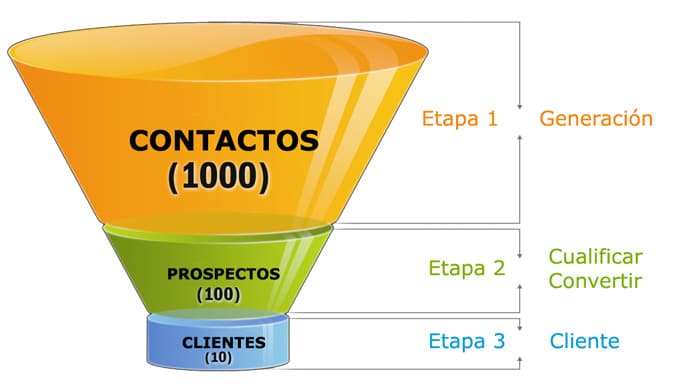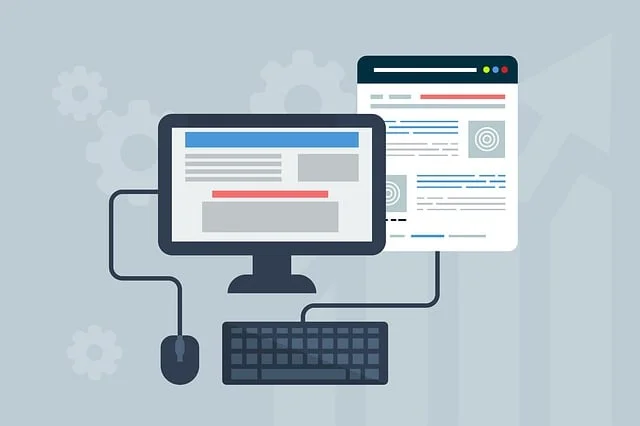In the marketing and business world, converting prospects into customers is a fundamental process for success.
One of the most effective methods to achieve this goal is through the use of a sales funnel.
A sales funnel is a model that represents the different stages a prospect goes through from their first interaction with the company until they become a customer.
In this article, we will explore the key stages of the sales funnel, as well as the strategies and tools needed to attract, nurture and convert prospects into customers.
In addition, the importance of optimizing the sales funnel through metrics analysis and process automation will be addressed.
What is a sales funnel and why is it important?
A sales funnel is a visual representation of the process a potential customer follows from the moment they become a prospect until they finally make a purchase.
This process is divided into several stages, each with its own marketing objective and strategy.
The funnel begins with the awareness phase, in which the prospect realizes they have a problem or need and seeks information about possible solutions.
Next comes the consideration stage, where the prospect evaluates the different options available and decides if your product or service can meet their needs.
The third stage is the decision, in which the prospect makes the decision to make a purchase or not.
It is important to have a sales funnel because it helps companies better understand consumer behavior and adapt their marketing strategies to increase the chances of conversion.
By knowing the stages of the funnel, marketing teams can focus on delivering relevant, targeted content for each stage, which increases the likelihood of converting prospects into loyal customers.
In addition, the funnel also allows you to identify the weak points of the sales process and improve them to optimize the conversion rate.
In summary, a sales funnel is a fundamental tool for any company that wants to maximize its sales potential and improve its marketing ROI.
The key stages of the sales funnel
The key stages of the sales funnel are fundamental to understanding the process of converting prospects into customers.
This funnel, also known as sales funnel, visually represents the path that a potential customer takes from the moment he/she shows interest in a product or service until he/she finally makes a purchase.
The first stage of the funnel is the awareness stage, where you seek to capture the prospect's attention and generate interest in what you are offering.
In this phase, marketing strategies such as advertising, relevant content and social media presence are used to attract the attention of the target audience.
Once the prospect is aware of the offer, they move on to the consideration stage.
This is where more detailed information is provided about the benefits and features of the product or service, with the objective of convincing them that it is the best option.
Techniques such as demonstrations, free trials and testimonials are used to build prospect confidence.
The next stage is the decision stage.
In this phase, the prospect evaluates the available options and decides whether or not to make the purchase.
Here it is essential to have a clear and simple sales process, as well as to offer incentives or discounts to motivate the purchase.
Finally, there is the action stage, where the prospect becomes a customer by making a purchase.
However, the sales funnel does not end here.
It is important to continue to nurture the customer with relevant information and maintain a good long-term relationship to encourage future purchases and recommendations.
In summary, the key stages of the sales funnel are awareness, consideration, decision and action.
Each of these stages requires specific strategies to effectively convert prospects into customers.
Understanding and optimizing these stages is crucial to the success of any business.
How to attract qualified prospects to your sales funnel
Attracting qualified leads to your sales funnel is crucial to the success of your business.
These prospects are those who have the greatest potential to become customers, as they show a genuine interest in your products or services.
To achieve this, it is essential to implement effective attraction strategies.
One of the first actions you should take is to clearly define your target audience and create a detailed profile of your ideal customer.
This will allow you to focus your efforts on attracting the right people.
Use different marketing channels, such as relevant content on your website, the use of relevant keywords in your SEO strategy and active participation in social networks relevant to your industry.
In addition, it is important to offer valuable and relevant content to your audience.
This can include blogs, videos, infographics or educational webinars that address your prospects' challenges and needs.
In this way, you will not only generate interest in your products or services, but you will also position yourself as an expert in your field.
Another effective strategy for attracting qualified prospects is to use targeted advertising.
You can use advertising platforms such as Google Ads or Facebook Ads to reach people who fit your ideal customer profile.
These platforms allow you to segment by geographic location, interests, demographics and other relevant criteria.
In short, attracting qualified prospects into your sales funnel requires a combination of well-planned and executed strategies.
By clearly defining your target audience, creating relevant content and using targeted advertising, you will be on your way to filling your funnel with prospects that have a higher potential to become satisfied customers.
The importance of nurturing and educating your prospects
The importance of nurturing and educating your prospects lies in the fact that, in most cases, potential customers are not ready to buy right away.
It is critical to understand that the buying process is a journey in which prospects need information and guidance to make an informed decision.
By nurturing and educating your prospects, you provide them with the knowledge they need to understand how your product or service can solve their problems or meet their needs.
An effective strategy to nurture and educate your prospects is through the use of relevant and valuable content.
This may include blog articles, downloadable guides, webinars or educational videos.
The goal is to provide useful information to help them better understand their problem and how your solution can solve it.
In addition, by nurturing your prospects, you are building a relationship of trust with them.
As you consistently provide them with valuable information, you become an authority in your industry and they begin to see your company as a trusted resource.
Another important aspect of lead nurturing is to personalize content based on their stage in the sales funnel.
Each prospect is at a different stage in the buying process, so it is crucial to tailor content to meet their specific needs at each point in time
In short, nurturing and educating your prospects is essential to guide them through the sales funnel and convert them into customers.
By providing them with relevant and valuable information, you build trust and prepare them to make an informed decision.
Converting prospects into customers: effective strategies
Converting prospects into customers is the ultimate goal of any sales funnel, and to achieve it, it is necessary to apply effective strategies.
First of all, it is essential to know your target audience well in order to personalize the sales process and adapt it to their needs and desires.
In addition, it is important to establish constant communication with prospects to maintain their interest and offer them relevant and useful information.
Another effective strategy is the creation of special offers or exclusive discounts to incentivize the purchase and generate a sense of urgency in the prospect.
It is also advisable to use testimonials from satisfied customers to reinforce confidence in the brand and in the product or service being offered.
Finally, it is crucial to properly follow up with prospects who have not yet converted, either through phone calls, emails or personalized messages, to remind them of the benefits of purchasing what is being offered and to provide them with personalized attention that makes them feel valued as potential customers.
In summary, converting prospects into customers requires a well-planned strategy that takes into account the needs of the target audience, effective and personalized communication, special offers and appropriate follow-up to build trust and encourage the decision to buy.
Optimizing your sales funnel: metrics and analysis
Optimizing your sales funnel: metrics and analysis
To maximize the effectiveness of your sales funnel, it is essential to rigorously track metrics and conduct a detailed analysis of the results obtained at each stage of the funnel.
This will allow you to identify areas for improvement, optimize your strategies and increase the conversion of prospects into customers.
One of the key metrics you should monitor is the conversion rate at each stage of the funnel.
This will give you a clear idea of how many prospects move through the process and become actual customers.
If you find that there is a significant drop at any stage, you will be able to investigate the possible reasons and take corrective action to improve that specific area.
Another important metric is the time it takes for a prospect to go through the entire funnel.
This will help you identify bottlenecks or delays in the sales process, which will allow you to optimize time and speed up conversion.
The analysis of traffic sources is also fundamental to improve your sales funnel.
You should identify which channels are generating the most qualified leads and focus your efforts on those that deliver the best results.
In addition, analyzing the demographic and behavioral characteristics of your prospects will enable you to adjust your segmentation and personalization strategy.
Finally, do not forget to evaluate the economic profitability of your sales funnel.
Calculating your return on investment (ROI) will help you determine if you are getting the right return on your marketing and sales investments.
In short, optimizing your sales funnel requires a thorough analysis of the relevant metrics.
Only through constant monitoring and objective evaluation will you be able to identify opportunities for improvement and maximize the efficiency of your sales process.
Sales funnel automation: tools and best practices
Sales funnel automation has become an essential tool for companies looking to improve their efficiency and productivity.
By using specialized software, companies can automate repetitive tasks and free up time to focus on more important activities.
Sales funnel automation tools can help companies manage and nurture their leads effectively, enabling them to move through the funnel to conversion into customers.
In addition, automation can also help measure the performance of the sales funnel, providing valuable information on performance and areas in need of improvement.
Best practices for sales funnel automation include making sure processes are well defined before starting automation, having an integrated system that can handle multiple marketing and sales channels, and using analytics to measure performance and adjust strategy as needed.
Other best practices include customizing content based on the target segment, nurturing prospects with educational and relevant content, and maintaining a constant flow of communication with prospects to encourage their interest in the brand.
With sales funnel automation, companies can significantly improve their efficiency and increase their lead-to-customer conversion rate.
In short, the sales funnel is an essential tool for any business looking to increase revenue and build customer loyalty.
Through the different stages of the funnel, from attracting prospects to converting them into customers and then building customer loyalty, effective strategies can be implemented to achieve business objectives.
In addition, the optimization and automation of the funnel allow for constant analysis of the metrics and a increased efficiency in the sales process.
However, it is important to remember that every business is unique and requires a sales funnel tailored to its specific needs.
Reflecting on how we can apply these strategies to our own business can be key to success in an increasingly competitive marketplace.


